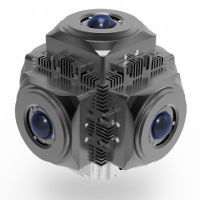Below is a selection of our projects that we are able to publicize. In addition, we have also completed numerous smaller projects and projects that have not yet been released publicly.

Folded Microscope for PUFFER rover
JPL, PUFFER, started 2015
Using a novel folded-optical microscope design, a high-resolution imaging system has been designed for next-generation rovers. These tiny rovers are designed to be lightweight and inexpensive, allowing many to be sent on a single mission and enabling missions that would otherwise be too risky. The rover's small size and small optic will allow it to investigate spaces that were previously inaccesible.

SCENICC - Soldier Centric Imaging via Computational Cameras
DARPA, SCENICC Program, 2011-2016
Distant Focus was funded under the SCENICC program by the University of California, San Diego to be the primary camera system integrator for the enhanced vision part of this program. The SCENICC program has resulted in high-resolution, compact and wide field-field-of-view imaging systems and continues through several spin-off programs, as well as DFC products.

Folded Optical Systems
A summary of some of our work with the Folded Optic architecture. This design allows us to dramatically shorten long focal-length optical systems and to build wavelength-independent optics that can be used in visible, SWIR, MWIR, LWIR, etc. The Folded Optic architecture was developed with UCSD under the DARPA MONTAGE program.

AWARE Multi-gigapixel camera system
DARPA, MOSAIC / AWARE Program, 2010-2015
Distant Focus worked with Duke University to develop multi-gigapixel camera systems based on a multi-scale design and was responsible for the electronics platform, ultra-compact sensor modules, and system integration. Distant Focus continues to use the electronics architecture for other multi-sensor systems, as well as building other full systems derived from the AWARE optical architecture.

Head Mounted Display
2012-2014
As a spinoff of a DARPA program, Distant Focus worked for another company on the optomechanics for a prototype Head Mounted Display (HMD).

OCM / MPM Microscope
NIST, SBIR, 2005
This project consisted of the design and construction of a dual function optical coherence microscope (OCM) and multi-photon fluorescence microscope (MPM).

MONTAGE Ultra-thin camera systems
DARPA, MONTAGE Program, 2004
The MONTAGE program explored novel form factors for camera design and led to the invention of the folded-optic architecture that has resulted in numerous additional systems.

ICIS Camera Array Demonstrator
DARPA, ICIS Program, 2002
Distant Focus constructed an array of 128 low-resolution cameras for demonstrating special algorithms to show how image diversity can produce an increase in resolution.

SensIT Large-Scale Sensor Network Simulation and Visualization
DARPA, SensIT Program, 2002
The goal of this program was to develop algorithms and investigate performance through the simulation and visualization of large-scale sensor arrays to determine optimal routing mechanisms.

LIDAR System Integration
UIUC / NAVY, 2001
This system was built for the purpose of generating data to study algorithms used in underwater mine detection.

UGS Tomographic Imaging with Unattended Ground Sensor Arrays
DARPA, UGS Program, 2001
The goal of this program was to develop unattended sensors and sensor arrays that accurately and robustly track targets using 3-D tomographic techniques.
